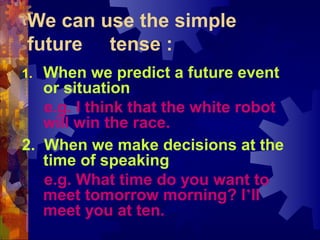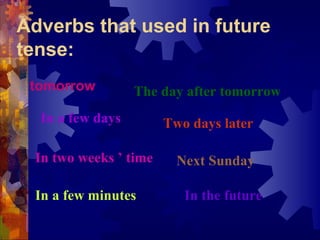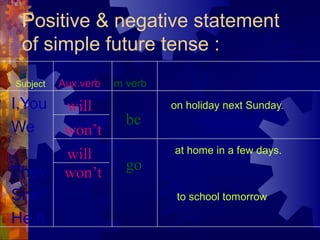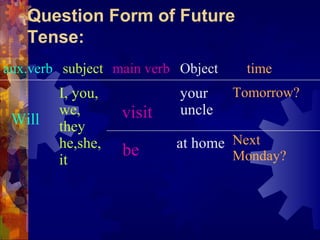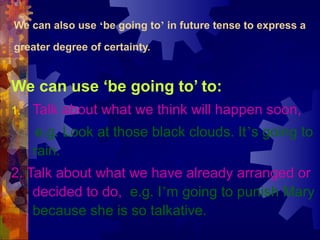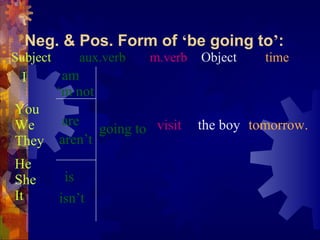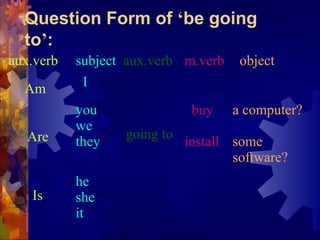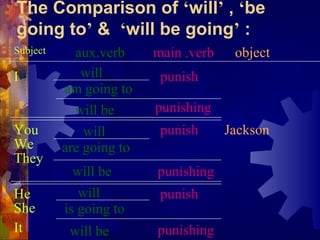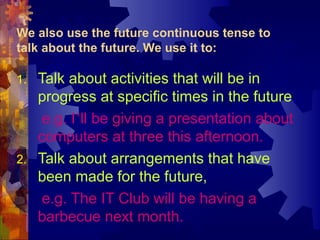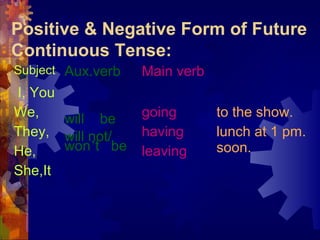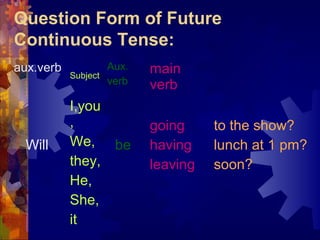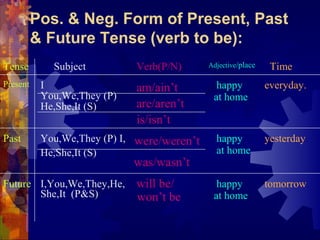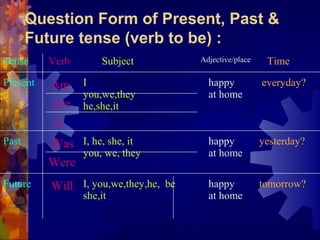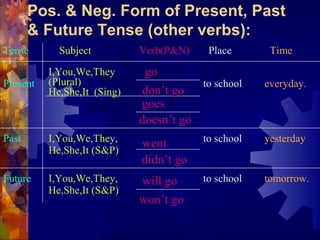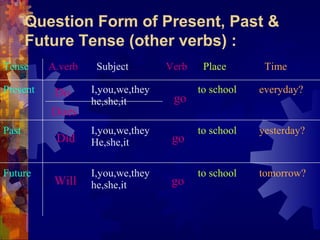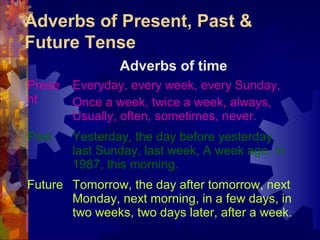Future tense
- 2. We can use the simple future tense : 1. When we predict a future event or situation, e.g. I think that the white robot will win the race. 2. When we make decisions at the time of speaking, e.g. What time do you want to meet tomorrow morning? Iâll meet you at ten.
- 3. Adverbs that used in future tense: tomorrow The day after tomorrow In a few days Two days later In two weeks â time Next Sunday In a few minutes In the future
- 4. Positive & negative statement of simple future tense : Subject Aux.verb m.verb I,You will on holiday next Sunday. We be wonât will at home in a few days. They go wonât She to school tomorrow He,It
- 5. Question Form of Future Tense: aux.verb subject main verb Object time I, you, your Tomorrow? we, visit uncle Will they he,she, at home Next be Monday? it
- 6. We can also use âbe going toâ in future tense to express a greater degree of certainty. We can use âbe going toâ to: 1. Talk about what we think will happen soon, e.g. Look at those black clouds. Itâs going to rain. 2. Talk about what we have already arranged or decided to do, e.g. Iâm going to punish Mary because she is so talkative.
- 7. Neg. & Pos. Form of âbe going toâ: Subject aux.verb m.verb Object time I am âm not You We are going to visit the boy tomorrow. They arenât He She is It isnât
- 8. Question Form of âbe going toâ: aux.verb subject aux.verb m.verb object Am I you buy a computer? we Are going to they install some software? he Is she it
- 9. The Comparison of âwillâ , âbe going toâ & âwill be goingâ : Subject aux.verb main .verb object I will punish am going to will be punishing You will punish Jackson We are going to They will be punishing He will punish She is going to It will be punishing
- 10. We also use the future continuous tense to talk about the future. We use it to: 1. Talk about activities that will be in progress at specific times in the future, e.g. Iâll be giving a presentation about computers at three this afternoon. 2. Talk about arrangements that have been made for the future, e.g. The IT Club will be having a barbecue next month.
- 11. Positive & Negative Form of Future Continuous Tense: Subject Aux.verb Main verb I, You We, will be going to the show. They, will not/ having lunch at 1 pm. He, wonât be leaving soon. She,It
- 12. Question Form of Future Continuous Tense: aux.verb Aux. main Subject verb verb I,you , going to the show? Will We, be having lunch at 1 pm? they, leaving soon? He, She, it
- 13. Pos. & Neg. Form of Present, Past & Future Tense (verb to be): Tense Subject Verb(P/N) Adjective/place Time Present I am/ainât happy everyday. You,We,They (P) at home He,She,It (S) are/arenât is/isnât Past You,We,They (P) I, were/werenât happy yesterday. He,She,It (S) at home was/wasnât Future I,You,We,They,He, will be/ happy tomorrow. She,It (P&S) wonât be at home
- 14. Question Form of Present, Past & Future tense (verb to be) : Tense Verb Subject Adjective/place Time Present Am I happy everyday? you,we,they at home Are he,she,it Is Past Was I, he, she, it happy yesterday? you, we, they at home Were Future Will I, you,we,they,he, be happy tomorrow? she,it at home
- 15. Pos. & Neg. Form of Present, Past & Future Tense (other verbs): Tense Subject Verb(P&N) Place Time I,You,We,They go Present (Plural) to school everyday. He,She,It (Sing) donât go goes doesnât go Past I,You,We,They, to school yesterday. went He,She,It (S&P) didnât go Future I,You,We,They, will go to school tomorrow. He,She,It (S&P) wonât go
- 16. Question Form of Present, Past & Future Tense (other verbs) : Tense A.verb Subject Verb Place Time Present Do I,you,we,they to school everyday? he,she,it go Does Past I,you,we,they to school yesterday? Did He,she,it go Future I,you,we,they to school tomorrow? Will he,she,it go
- 17. Adverbs of Present, Past & Future Tense Adverbs of time Prese Everyday, every week, every Sunday, nt Once a week, twice a week, always, Usually, often, sometimes, never. Past Yesterday, the day before yesterday, last Sunday, last week, A week ago, in 1987, this morning. Future Tomorrow, the day after tomorrow, next Monday, next morning, in a few days, in two weeks, two days later, after a week.


